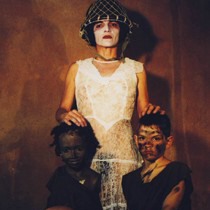
The exhibition is curated by David Brits, and participating artists are Wayne Barker, Christo Doherty, Paul Emmanuel, John Liebenberg, Jo Ractliffe, Colin Richards, Chad Rossouw, Penny Siopis, Christopher Swift and Gavin Younge. Exhibition and catalogue text by Natasha Norman.
Up until 1994, almost all able-bodied white South African men were called up for National Service around the year they turned 18. Most were put through rigorous physical and skills training, and many sent to fight in South Africa’s so-called Border War in Northern South West Africa and Southern Angola. Marking the 25th anniversary of what is now commonly referred to as the Border War’s bloodiest and most decisive battles, most notably at Cuito Cuanavale, Not My War looks at how a selection of artists have been impacted by and responded to this critical point in the nation’s history.
As far as most of these conscripted young men were concerned, there was little option but to perform their national duty. One’s call-up could be deferred for a few years if one studied, but to avoid it meant facing harsh consequences. The options were to object on conscientious or religious grounds and face a six-year jail term, or flee the country.
Since the shift in political power in 1994, many of the men that fought in Border War have felt themselves to be recast in an insidious light. While many soldiers believed the SADF’s rhetoric that they were fighting in Angola to shield their country from the violent tide of communism, the war is now widely regarded as an unjust conflict that upheld the racist interests of Apartheid. The Border War has in many ways become forgotten in post-Apartheid South Africa, as remembering this ‘silent war’ it would mean – both on an institutional and personal level – engaging the struggle to reconcile the propaganda, trauma, heroism and racism implicit in a discussion of its nature.
In recent years, however, a large amount material concerning South Africa’s Border War in Namibia/Angola has burst onto the cultural landscape. Where a decade ago such material was scarce, in the last five years there has been a considerable surge of novels, biographies, documentaries, films, theatre, photography and visual art all dealing with this subject. It would seem that the muzzle on South Africa’s ‘silent war’ – in the cultural sphere at least – has begun to lift.
Furthering the resurgence of dialogue around this ‘silent war’, Not My War will endeavor to engage the complex personal and institutional discourse surrounding this conflict, as well as highlight the war’s continuing relevance and effect on South African society.
The exhibition opening is at 18:00 on 29 June, and it will run until 27 July. Opening hours are Tuesday – Friday 11:00 to 16:00, Saturday 10:00 to 13:00 or by appointment.
The exhibition is made possible through a grant in aid from the Gordon Institute for Performing and Creative Arts (GIPCA) to Michaelis Galleries.
For further information, please contact Michaelis Galleries on +27 21 480 7170 or cara.vanderwesthuizen@uct.ac.za.
Featured image: Comrade Mother (1994), by Penny Siopis. Photograph by Jean Brundrit.
Start: 29 Jun ’12
End: 27 Jul ’12
Cost: Free
Category: Exhibition
Organizer: Michaelis Galleries
Email: cara.vanderwesthuizen@uct.ac.za
Venue: Michaelis Galleries
Phone: +27 21 480 7170
Address: Google Map UCT Hiddingh Campus, 31 Orange Street, Cape Town, 8001, South Africa
